CTP Episode of the Day - 01.01.07 - The Truth (Part I)
I sincerely apologize for the very, very, VERY late posting of this, our final CTP Episode of the Day. I didn't intend to take this long in putting this together, but I pulled information from many different sources, and putting it all together in some semblance of order took more time than I thought it would. It's quite long, and I apologize for that too, as I'm sure many of you don't give a rat's patootie about "The Truth" or anything that had anything to do with Season 9, for that matter. (Because of its length, I'm posting it in three parts.) But I enjoyed putting it together, finding out some things I didn't know, and I hope those of you who do enjoy "cherishing the past" will find it interesting and entertaining. I included some of my own observations as well, so I hope you don't mind that; if you do, just skip over those and "stick to the facts." And that's The Truth.
Today's Cherished Episode: The Truth (9x19/20)
Original Air Date: May 19, 2002
Written By: Chris Carter
Directed By: Kim Manners
Mulder's return leads to his being tried before a military tribunal that seeks to justify and prove the very existence of an alien conspiracy – and the X-Files themselves.
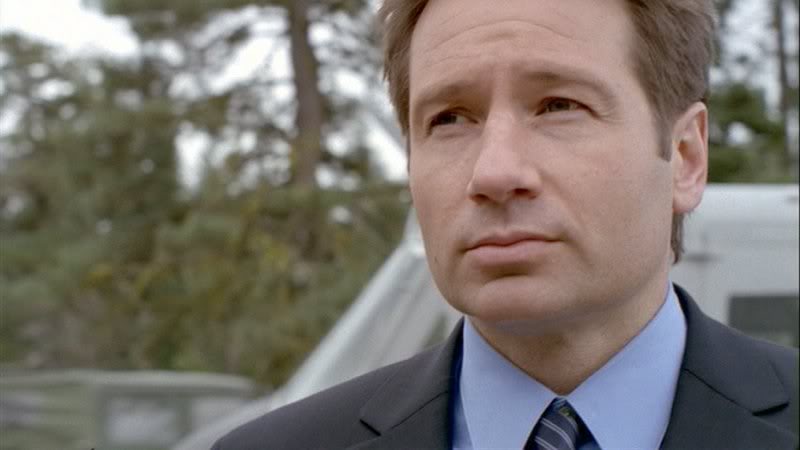
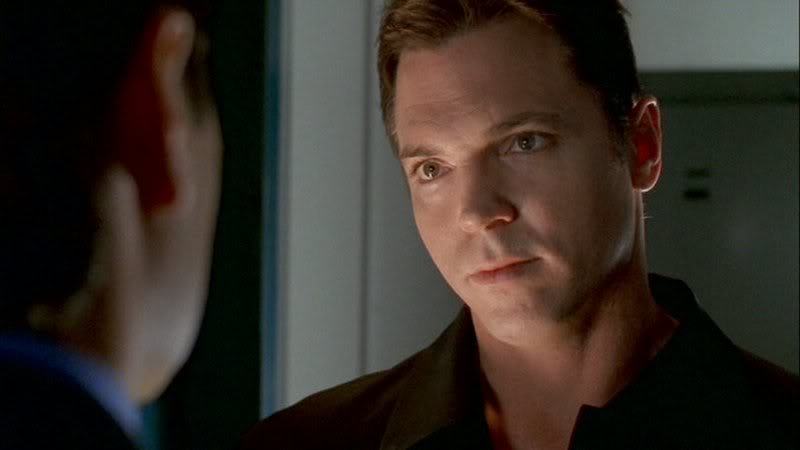
S: "Why would I accept defeat? Why would I accept it, if you won't? Mulder, you say that you've failed, but you only fail if you give up. And I know you -- you can't give up. It's what I saw in you when we first met. It's what made me follow you. Why I'd do it all over again."
M: "And look what it's gotten you."
S: "And what has it gotten you? Not your sister. Nothing that you've set out for. But you won't give up, even now. You've always said that you want to believe. But believe in what, Mulder? If this is the truth that you've been looking for, then what is left to believe in?"
M: "I want to believe that the dead are not lost to us. That they speak to us as part of something greater than us -- greater than any alien force. And if you and I are powerless now, I want to believe that if we listen to what's speaking, it can give us the power to save ourselves."
S: "Then we believe the same thing."
M: "Maybe there's hope."
Nine years. More than 200 hours of television. A feature film. Little green men, government conspiracies, and liver eating mutants. A move from rainy Vancouver to sunny L.A. Losing your sister but meeting your perfect opposite. Births and deaths, on-screen and off. Leather sofas, missing nameplates, and gold crosses that masqueraded as zippers. Cigarette Smoking Pontiffs, Well Manicured Men, and Ratboys. Contract negotiations and lawsuits. Shippers, noromos, and fence sitters. Old girlfriends, new partners, and absent centers. Conversations in the car, on the couch, and on the rock. Experiments, abductions, and resurrections. Mytharc and Monsters of the Week. "He's just gone." And we were here for all of it. Or at least most of it.
Some "The Truth" Tidbits & Musings:
-- When cast and crew began to assemble in late summer of 2001 to begin work on the ninth season of The X-Files, at least on the surface, it was with an air of enthusiasm and optimism.
-- "I felt season nine was an exciting season to be going into because we were, in a sense, starting anew," said executive producer Vince Gilligan. "Two new agents were running the X-Files office."
-- "David Duchovny was not available," added executive producer John Shiban. "but Gillian Anderson was, and her participation was only slightly limited. We all knew that it would be her last year. It was the end of her contract and she intended on moving on. We felt this was a new series, this was a new beginning."
-- "At the beginning of season eight, I wasn't sure whether the show still had creative vitality," said executive producer Frank Spotnitz. "But at the beginning of season nine, I felt no hesitation. I felt Robert Patrick was great. We still had Gillian Anderson. And Annabeth Gish was going to be great."
-- But enthusiasm and optimism soon waned, as the season premiere for the first full season since the departure of David Duchovny drew less than stellar numbers, down almost 4 million viewers from the Season 8 finale, "Existence." And things went progressively downhill from there. The ratings leveled off after six episodes (including mythology episode "Trust No 1" which was bumped up in the schedule in an attempt to attract viewers), but there was no sign of improvement. The show was averaging well less than half of the 20 million viewers that it attracted at its peak, and was ranked 85th for the season at that point.
-- On January 17, 2002, Chris Carter announced that he had decided to close The X-Files at the end of the ninth season. At the time, rumors were swirling that Fox had advised Carter that the show would be cancelled at the end of the season because of declining ratings, and gave Carter the option of "bowing out gracefully." Carter has long denied these rumors, and Fox has never indicated the series was in danger of cancellation.
-- "The decision to end the show was mine," Carter said. "This was such a special series. I didn't want it to just limp along." (Though most viewers and critics agreed that it had been limping along for at least the past two seasons.) "I thought about it over the Christmas vacation. We had premiered the show in its ninth season in November and we were up against all kinds of stiff competition. We were counter-programmed very effectively -- including our season premiere which was up against Saving Private Ryan -- and so our numbers were down. They were respectable numbers and we were still head to head with the competition, but they weren't the numbers that we had been getting in year eight."
-- "It was obvious that some of the audience had left and I didn't know where they had gone," Carter continued, "because I thought we were doing good work and I thought that the addition of Annabeth and Robert to the show was a good and effective one. You could blame it on a lot of things. You could blame it on more good shows on Sunday nights. You could say it was because of David's departure. You could say it was because of 9/11. You could say it was because we premiered late and in heavy competition. I ultimately don't know what it was; but my sense was that when David left, and the show was no longer directly about Mulder and Scully, a portion of our viewers felt something had been completed, and they didn't come back."
-- "Everything changes, and sometimes you can't quite figure out where the viewers have gone," Carter said. "They may have grown up, gotten married, changed their habits or tastes. There are so many variables when a show gets into its gray years -- it's inevitable. The whole demographic changes. I spoke at a college over the summer, and I'm in a classroom with 100 kids, 17, 18, 19, and 20 years old. These kids were 8, 9, 10, or 11 when the show started. They probably didn't watch The X-Files. I realized I was dealing with a whole new generation of viewers."
-- "I didn't want to see any analysis that Robert and Annabeth were somehow responsible for the lower ratings, so I decided that I would rather call it a day than see someone trash the show, trash them, and trash me when I thought we were still doing excellent work," said Carter. "I didn't want to hold on past a point where the story became about the show's diminished ratings. I felt it was time to close up shop. So my determination was to go out with a series of very, very strong episodes that were going to pull a lot of threads together from the last nine years, and hopefully look forward to an X-Files film franchise."

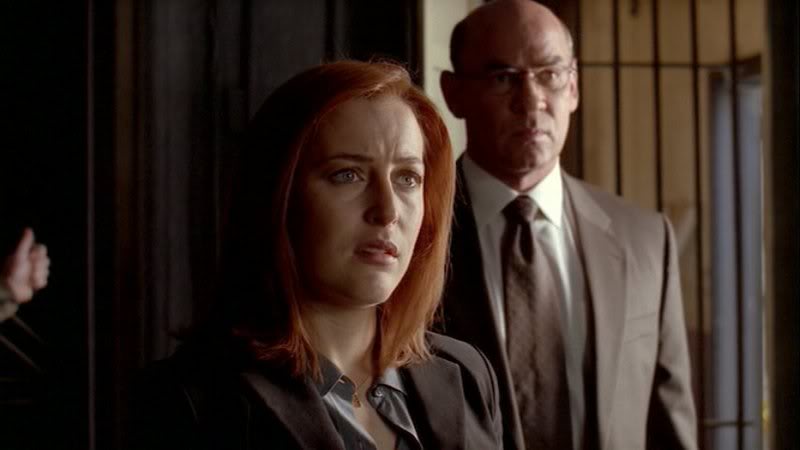
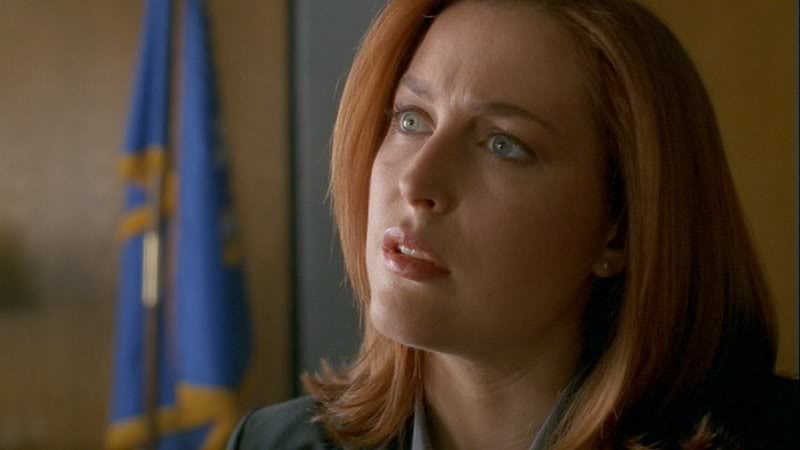

-- Though it was difficult, in some ways the decision to pull the plug was a relief. "For me, it's been 10 years now," he said. "The show has been on the air for nine years and it took me a year to get it off the ground, so it's something I've been doing for quite a long time. But the decision was difficult because I thought we were doing such good work in season nine."
-- "It was very difficult to tell Robert and Annabeth about the decision to end the show because I think they felt responsible, and they weren't," Carter said. "They worked hard. They were both terrific actors and they gave everything to the show. If there was any blame, it was on some mysterious 'x' factor. The addition of those actors was really fun for the writers and producers. They were excellent to work with and excellent to write for. We told X-Files stories in new ways, using the trio of Scully, Reyes, and Doggett, and it was an interesting exercise telling the stories. And it was interesting to have David gone for a year and still have him be such a looming presence on the show -- even though he was not on it."
-- Both Patrick and Gish, who joined the cast with the idea of taking the show in a new direction, were disappointed but not surprised. "I was hoping that the show would go longer," said Patrick. "But when I started, I wasn't sure it was going to go one year. So the fact that it went two was a victory. The best part about it is that I know the show will live on forever. I feel like I got involved in something great. When you think about the history of TV, you'll think about The X-Files." Added Gish: "I was sad for the loss of the opportunity to continue to explore Reyes, because I was just starting to hit my stride with her. But The X-Files was a train I jumped on that was already traveling fast and far. I got a great view and a great ride."
-- "If you ask me, we should have ended it two years ago," Anderson said when the news was announced. "They couldn't have found two better actors than Robert and Annabeth to take over, but the show was about Mulder and Scully. I think it was a difficult transition for the audience to make. I was so excited to learn that David was returning for the finale -- he called me and we had a conversation about it. I guess I didn't realize how much I was missing him and how integral he was to the show, so I didn't realize how important it would be for him to return, that we needed his presence to make a necessary closure. I was very excited to see him and to have the Mulder-Scully experience again. It's something indescribable that can't be duplicated, and that's a wonderful thing the two of us had together."
-- "I don't think I would have known until the very end how different it might have been if David had not come back for the finale," Anderson said. "At the end, I would have thought, 'Well, wait a minute. This isn't right.' I was very glad the show was ending completely at the end of the ninth season, after which I had planned to leave, because I had a feeling that, even though I would have mourned to a certain degree in saying goodbye, there would have been something left undone. Because the crew would have been continuing and, even though I was saying goodbye, it wouldn’t have been as clean. I feel like we had an opportunity to really tie it up in a whole and constructive and completing way."
-- On February 21, 2002, Carter made the official announcement that David Duchovny had not only agreed to return for the series' two-hour conclusion, but also to direct another episode ("William"). Carter revealed that he had contacted Duchovny about directing an episode before making the decision to end the show, and during that discussion, Duchovny suggested that he was open to acting in the episode as well. "That was a big surprise to us," Frank Spotnitz said. "We certainly didn't expect that."
-- "I wasn't really that surprised at David's interest because we had been in contact all year long," Carter said. "And any differences that we had [over Duchovny's lawsuit] seemed to have been something we had both gotten past. I think David realized it was important to the future to participate in the present. The Mulder and Scully partnership *was* The X-Files for eight years. You can't discount that."
-- "David and I had several meals at several different times after the settlement of the suit and worked things out," said Carter. "I still blame vertical integration as the big problem and David's suit was the beginning of something that you will probably see a lot more of. What happens is that when the buyer and seller are the same person, it pits everybody against everybody and it was not good for working relationships. But I think David and I successfully buried the hatchet."
-- Before the deal was cinched, Carter decided to end the series, and when that happened, the priority shifted to coaxing Duchovny back for the two-part finale. "Landing David for the finale was crucial," Carter said. "But at that point, all it took was business negotiation. David wanted to do it. In some ways, he missed the show, and he missed the character. He told me so. What became uncertain at that point was whether he would still co-write, direct, and act in the April 28 episode. The final outcome was that he would act in the finale and co-write and direct 'William,' but not act in it."
-- "My impression from talking to David was that he still cared about the show," said Spotnitz, who only a few months earlier had put the odds of Duchovny ever returning to the series at "slim to none." "He was still invested in it and certainly cared about Mulder. And I think he recognized that it was the best thing for the show and the audience for him to come back and give closure to nine years of the series. I think we all agreed on that."
-- According to Carter, he harbored no grudge toward Duchovny for not sticking with the series. "I understood," he said. "He turned 40 years old, he had things he wanted to do. Eight years was a long time to be on a television show. He honored his contract and then some and I couldn't have asked for more. I wished him the best when he left and I meant it. It was just really nice to have him back."
-- "I didn't miss the grind of the show," said Duchovny in explaining his decision to return, "but I kinda missed not being that guy. He's a cool guy, and I like him. I'll admit it was kind of frustrating at first, trying to escape the shadow of Fox Mulder. But eventually, you come to grips with the fact that this was an iconic character and it was not going to go away. So I didn't struggle against it anymore. I would just say, 'Thank you.' And if I can come up with an iconic character every decade, I'll be happy."
-- During his absence, Duchovny admitted to occasionally tuning in to see what the old gang was up to. "Once in a while on a Sunday night I'd tune into that Fox network and see what they were doing," he said with a smile. "I would hear Chris saying 'we have so many stories to tell.' And I wanted to see what stories they were telling.'
-- "I don't think anybody but my mom stopped watching the show after I left," Duchovny said with characteristic humor. "Actually not even her. My mom would call me and say, 'That Robert Patrick, I love him!'"
-- So with all the characters in place, work on the finale script was ready to begin. "It was interesting for us because we were able to build up to the finale," Carter said. "The previous two or three years, the final episode of each season was done without knowing if the show would be back or if I would be back. That was tough, but it became harder once the decision to end the series was made, because we knew we had no other chance to go back and re-explain things. We had to hit all our marks. Also, emotionally, we had to be honest with the characters and the journeys they went on. We wouldn't get the chance to go back with them either. I never had a show go 200 episodes, never had to wrap up nine years of storytelling. Who teaches you those things? I don't know."
-- When the first discussions regarding a series finale began forming in the middle of the eighth season, Frank Spotnitz said that he thought it would be useful to air an hour-long synopsis of the series mythology prior to the finale. In essence, that’s exactly what occurred. The first hour of "The Truth," and part of the second hour, was little more than a convenient device for laying out the mythology in its most simple and inelegant form.
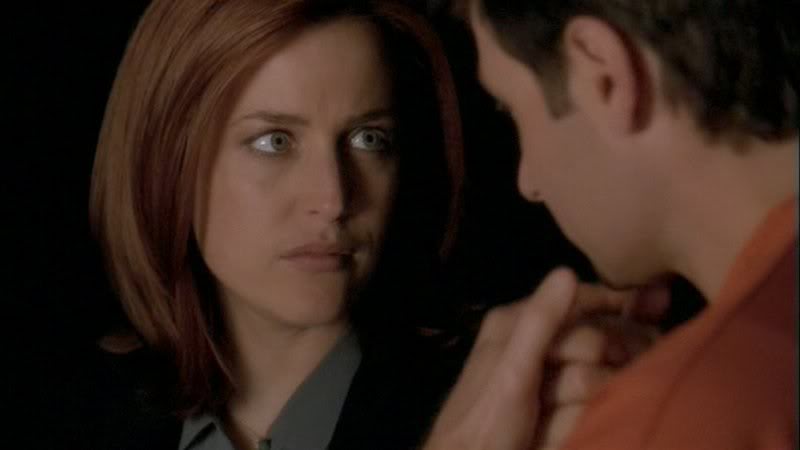
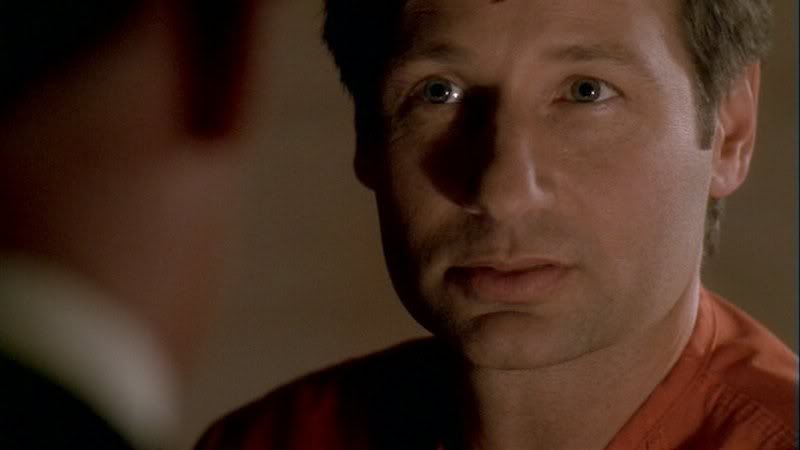
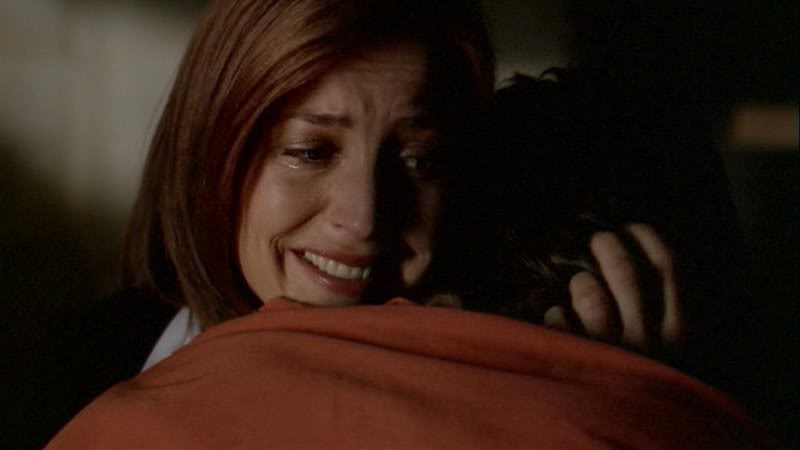
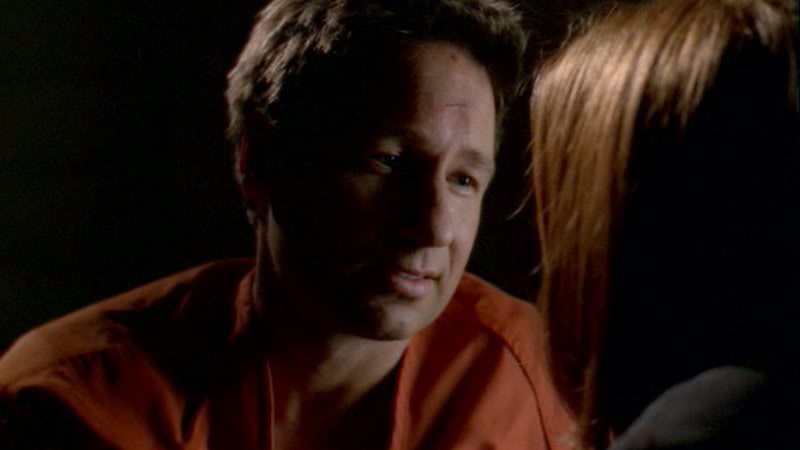
-- "As the script began to take shape, we came up with this format that allowed us to look back on the past years and comment on what they meant," said Frank Spotnitz. "To talk about the journey Mulder and Scully took together, and where they are left after nine years. We decided that most of the show, a huge portion of it, would be in a courtroom."
-- "Chris wasn't big on courtrooms, so that was very unusual for us," Spotnitz continued. "Courtrooms may be a staple of television dramas, but for us it was how to do it in a way true to our show. So that was the challenge. And then we agreed we had to be coherent about the mythology of the show, what could be addressed and what could not, what questions could be answered and what could not, just because it would become too complicated for the general viewer to follow."
-- "I never presumed that we could answer all the questions," said Carter. "But we wanted to make everything make sense. And I think we were trying to make it a reward to people who watched the show faithfully for nine years."
-- In deciding what elements should be addressed in the finale, the first thing Spotnitz did was go on-line. "I looked at what many people had written about the mythology," Spotnitz said, "and I was alarmed at how many people who are extremely knowledgeable about the show and had followed it religiously had drawn false conclusions and false connections between things. I realized that was going to confuse me even more if I looked at those things, so I abandoned that approach."
-- "Then I had our researcher go through all of our mythology episodes and pull the script pages that talked about the larger framework of the series," said Spotnitz, "and I reread all of those. Then I organized the mythology of the show by character -- which characters would be best to explain which parts of what the show had been for nine years. And so that was really what happened -- you had witnesses who told you different parts of what happened. An awful lot was said, an awful lot, but even then, you realize it was still just skimming the surface, because you would need eight hours if you really were going to touch on everything we had done over nine years. It was an amazingly complicated, sometimes convoluted conspiracy. I'm just astonished people stuck with it for as long as they did."
-- "Fox spent a huge amount of money on the cast so we could bring back a lot of familiar faces," Spotnitz said. "But I thought it all fit. I thought viewers would realize why we chose certain people, and why we left out others."
-- Although it had many two-part and three-part episodes over the years, this was The X-Files' first two-hour broadcast.
-- As part of Chris Carter's "inner circle," Kim Manners who was selected to direct the two-hour finale, was among the first to learn that Carter planned to "turn off the lights" at The X-Files. "Chris made the right decision," he said. "The show was over. It ran for nine years. It was time to walk away and move on to other things. I think it ran its course. But I was sorry that so many of the X-Philes didn't follow the show for the eighth and ninth seasons after Duchovny left. I think they missed a great arc in the odyssey of the adventure. But it was definitely time to go."
-- But Manners did not agree with those who felt the show should have closed shop at the end of the seventh season when Duchovny left the show full-time. "The X-Files were the X-Files, not 'The Mulder Files,'" Manners said straightforwardly, which raised the ire of some long-time fans. "I thought Robert and Annabeth, with Gillian, brought a whole new dimension to the show. You couldn't predict how the show would have gone had it been turned over entirely to Doggett and Reyes, to this new X-Files team. It could have gone for another year or two, maybe or maybe not. We'll never know that. In Season 9, the torch was being passed from Gillian to Robert and Annabeth, but they never had an opportunity to carry the show themselves. As actors, Annabeth really came into her own in Season 9, and Robert was a steely factor in keeping the show alive for the last two years."
-- "If I had one criticism of the show after David left," added Manners, "I think the show made a wrong turn in killing off our villains. We killed off Cigarette-Smoking Man. We killed off Krycek. We barely saw Marita Covarrubias again. I think that might have hurt the show for the serious X-Philes. But other than that, I think the show lived as long as it should live. And it was dying a natural death when it should have died a natural death."
-- Kim Manners directed a total of 53 episodes of The X-Files. He noted that he felt very privileged to have been selected to direct "The Truth" (episodes #52 and #53) and that it was a great culmination of his nearly eight years on the show. "It was a difficult shoot," he recalled. "The script was still evolving as we shot, only because every day we wanted to make it better. But the show was always a challenge because it was always last-minute, always spontaneous."
-- "That was one of the reasons the show worked over the years." Manners added. "We thrived under pressure and we didn't stop trying to make it the best it could be until it was time to put it on the air. This finale was no different. We were winging it! What can I tell you? And we were getting it done."
-- "I knew David would come back," Manners said. "Whatever money he got -- that wasn't important to him. He wouldn't miss the end. The show was too much of his life. If he hadn't come back for the finale, any future for the show or a movie franchise would have had to be very different. Because he came back, the finale was able to answer a lot of questions and at the same time, clear the slate, or some of the slate, for the future."
-- Cast and crew spent more than 25 days filming this two-parter, "quite a luxury in television," Manners observed.
-- As filming got underway, the mood was more upbeat than melancholy. "I'm feeding off the energy of just being here," said David Duchovny. "It's great, hanging out with your friends and playing a character you like to play. And it's a monster of an episode. With 25 shooting days, it's just like a movie -- you can't see the end of it. I think when we get three or four days away from the end, it's going to get really weird."
-- Gillian Anderson had similar vibes. "It hasn't hit me," she said when filming began. "There are just too many things going on right now to be waylaid by emotion."
-- "The work was so hard and there was so much to do," said Chris Carter. "It was a demanding schedule, and on top of that, I broke my arm during the course of the filming. There were lots of things to distract us from what was really going on, which was that the band was breaking up."
-- Mount Weather, where the episode's teaser was set, is a real place. The Mount Weather Emergency Operations Center is a U.S. government facility located near Bluemont, Virginia. The U.S. government has revealed little about Mount Weather, although it has acknowledged its basic existence and stated purpose. It houses operations and training facilities above ground for the Federal Emergency Management Agency (FEMA) and contains an underground facility designed to house key components of the American government in the case of nuclear warfare or other calamity.
-- Standing in for Mount Weather, the episode teaser was filmed at a Hydroelectric Plant at the man-made Shaver Lake near Fresno, in the foothills of the Sierra Nevada Mountains. "We were only about the second film crew to film there," recalled locations manager Ilt Jones. "This was one of the main facilities supplying power and water in California, and in light of September 11, they had to be very careful who they permitted to be in there. We had to have background checks on all the cast and crew -- and there were over 200 crew members on site."
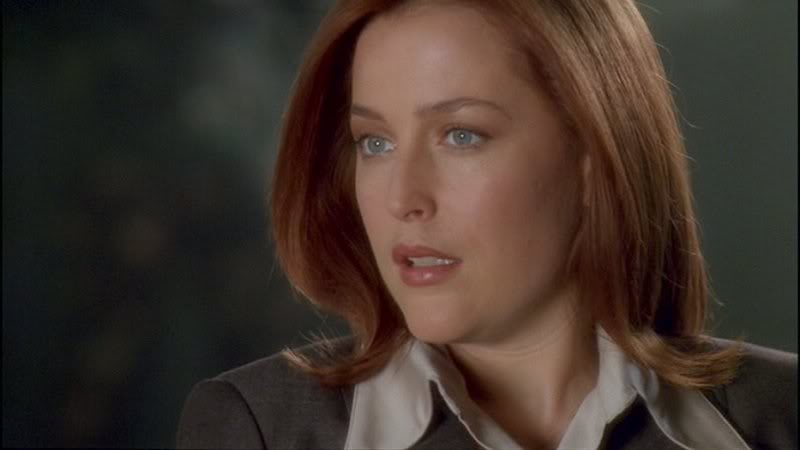
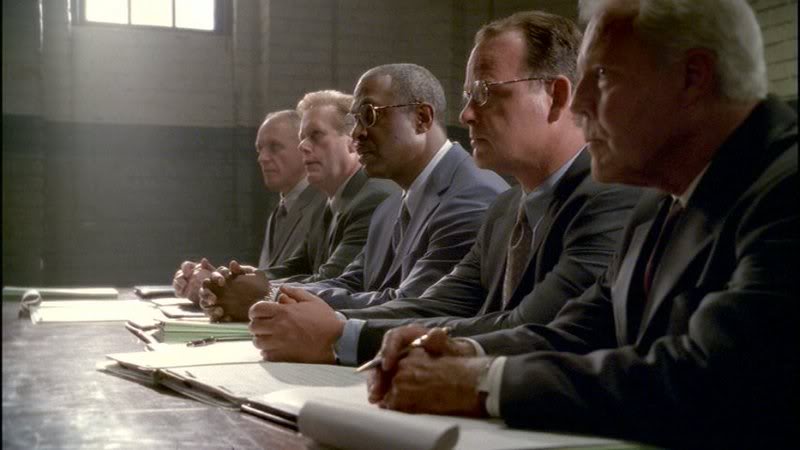
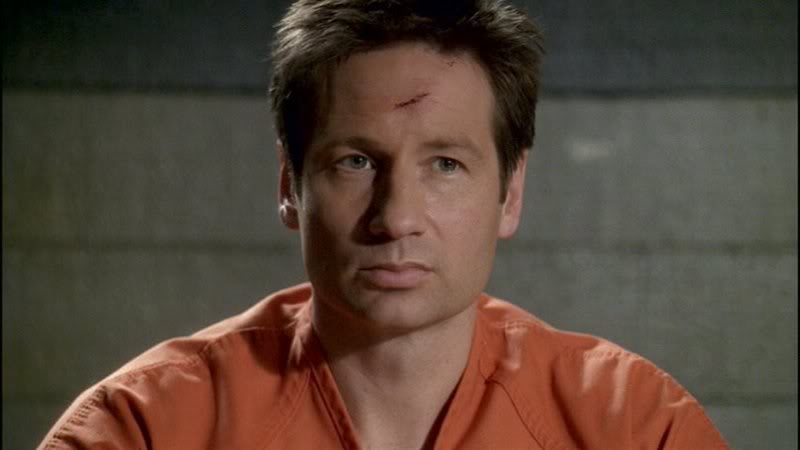
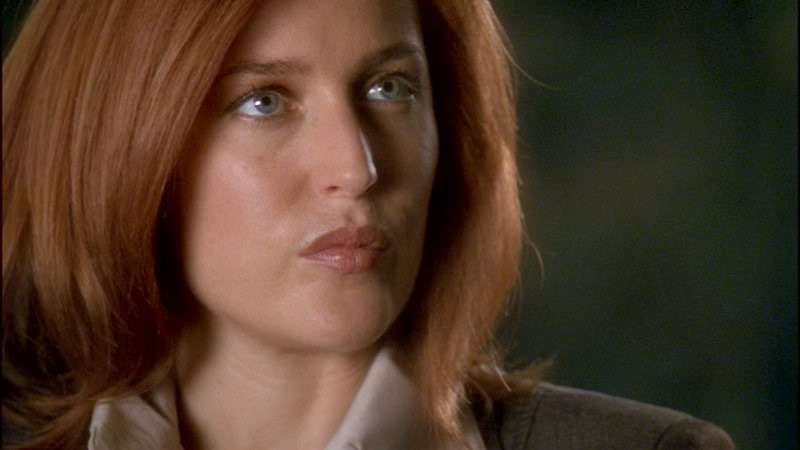
-- The tunnel where some scenes were shot descended several thousand feet underground and led to the plant's main room which was also used for shooting some scenes. "We called it the War Room," said Kim Manners. "There was really nothing in there but the generator; all the rest was set dressing. The crew spent four or five days just preparing the lighting for those scenes."
-- While scenes filmed in the main room of "Mount Weather" were on location, the room where Mulder accessed the computer was a set built at the studio. The "screen" where the computer output appeared was a piece of glass and the words were computer generated in post-production.
-- The first words that appeared on the screen were "end game." In chess, the "end game" occurs when one player captures the opponent's king, when one of the players resigns, or there is a stalemate [tie].
-- Cigarette-Smoking Man said several times during the course of the series that "the date is set"; and in "The Truth," "the date" is revealed to be December 22, 2012.
-- It's likely that "the date" chosen by Chris Carter had something to do with the Mayan "long-count" calendar which measures a "great cycle of 5,125 years" and which ends on December 21, 2012, the day of the winter solstice. Most Mayan calendar counters expect major "earth changes" of the cataclysmic variety on that date; and many also believe that humankind will be transported from the "third dimension" to the "fourth dimension," a new galactic state of consciousness. Because the Mayans synchronized their calendar to the skies, spectacular astrological alignments are also expected in 2012.
-- The Season 9 DVDs offers great background information on how the fight/chase scenes between Mulder and Knowle Rohrer were filmed.
-- Though it wasn't David Duchovny who was tossed through the glass screen in the computer room, it was really David Duchovny hanging off the crane platform, 80 feet above the "war room" (connected by a safety cable, of course) after tossing Knowle Rohrer over the side.
-- "The Truth" featured the most actors ever to appear in the opening credits -- 5 (David Duchovny, Gillian Anderson, Robert Patrick, Annabeth Gish, and Mitch Pileggi).
-- Nekkid, stubbly, brainwashed Mulder -- who could ask for anything more? < g >
-- Mulder's torture scenes from the first act were the first scenes filmed for the episode (filming began on March 26, 2002). The scene of Doggett and Skinner springing Mulder were filmed on the same day.
-- The location jail scenes were filmed near Long Beach at Fort MacArthur, an abandoned military base that was once part of a series of military installations that guarded America's west coast after the Japanese attacked Pearl Harbor on December 7, 1941. The facility was constructed in 1914 and was named for Lt. General Arthur MacArthur (father of General Douglas MacArthur).
-- A scene that was included in the shooting script but cut from the final version showed Skinner calling Scully (who was exiting her shower) to tell her Mulder had been found. The scene was cut primarily for time, remarked Frank Spotnitz and John Shiban, even though they hated to cut "sexy Scully" who was clad in only a towel. "That was a tough choice," joked Spotnitz, "but actually, the scene that followed was a better reveal for all the characters."
-- From Carter's direction notes in the shooting script when Skinner and Scully entered the holding room: "Scully's eyes find something o.s. which makes her knees weak." (Ours too, Chris!)
-- Kim Manners noted that the actors on The X-Files were the nicest he had ever worked with. "No one ever developed an attitude. They were there to do their best job and they always did it.
-- Manners also noted that "fortunately, we had a cast that did not like to rehearse. They were always very comfortable with what the director had set up. They were always ready to pull the trigger," Manners added. "I am one of those directors who believe the first takes are the best. The more you film it, you just lose that spontaneity."
-- As filming progressed, Manners noted, "There were days that were really emotional and days where we were all very stoic. We were going through every human emotion. It was very strange. We fought with each other. We apologized to each other. Everybody was under great pressure. It was a very, very foreign feeling. It was a very bittersweet resolution for all of us knowing that, finally, we were doing the last show. For the last four years we had wrapped up in April, never knowing whether or not we were coming back for another season. This time, we know this was it. Knowing that, I think we were all savoring every day, every moment on set, as painful as it might have been, as demanding as it might have been."
-- Citing the scene between James Pickens, Jr. (Kersh), and guest-star William Devane (Suveg) as a good example, Manners said, "Our actors always knew how to underplay a scene and I think that was a hallmark of the show. Underplaying brought the ridiculous into a certain work of reality."
-- The shooting script noted that when Scully and Skinner first arrived to visit Mulder in his holding cell, Mulder was in a "yoga pose." Kim Manners recalled that David Duchovny was standing on his head when the scene began, but that part was trimmed for time.
-- "I smelled you coming, Clarice," was a reference to the film Silence of the Lambs. Jodie Foster's female FBI Agent character in that film was an inspiration for Agent Dana Scully.
-- In the shooting script, Mulder followed that line with "I had you. I had you both."
-- For those counting, the initial kiss between Mulder and Scully in the jail cell lasted about 12 seconds (without coming up for air!) and the full clench lasted about 30 seconds. Except that it could have been a bit better lit, it was a lovely reunion.
-- Thankfully, the reunion smooch wasn't scripted as a "forehead kiss," so Carter seemed to have finally "got it." The script direction indicated, "[Mulder] steps to Scully, kisses her tenderly. She returns the kiss, desperately." (The actors gave us a slightly more intense interpretation!)
-- Carter was always baffled by the interest in the Mulder/Scully physical relationship. Of the characters' first real kiss in "Millennium," he said, "It always tickled me that in this day and age, when we had characters jumping into bed with each other at the drop of a hat, that there was so much anticipation and so much attention to what ultimately became a peck on the lips."
-- Mulder's line to Skinner in the shooting script was "Come here, Big Boy."
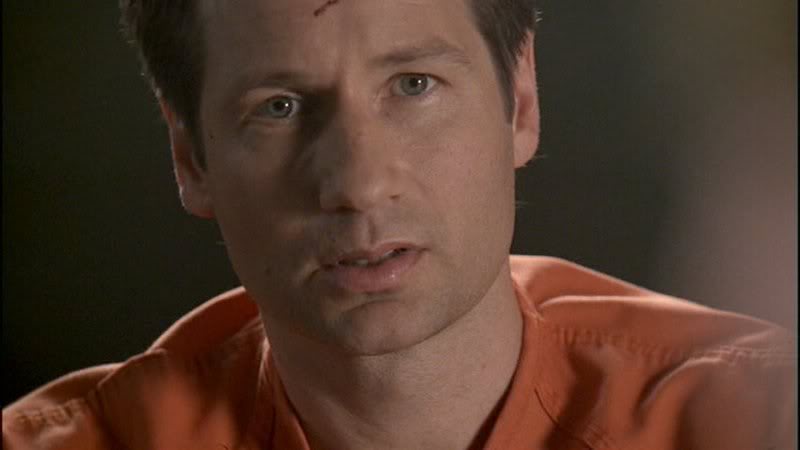
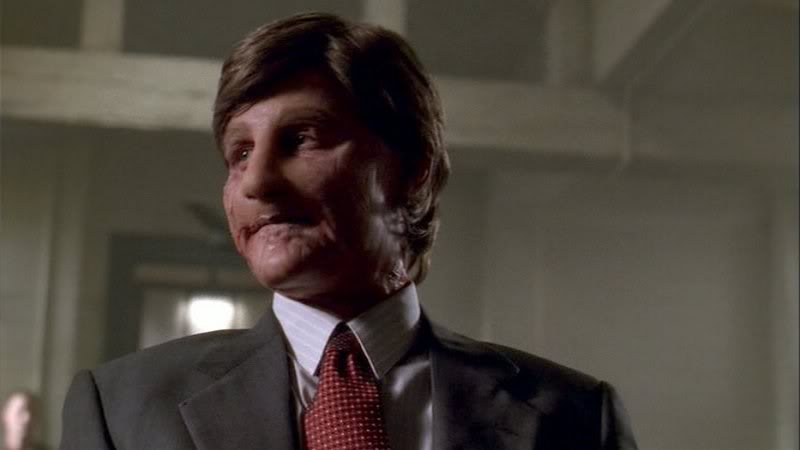
(Continued in The Truth -- Part II)